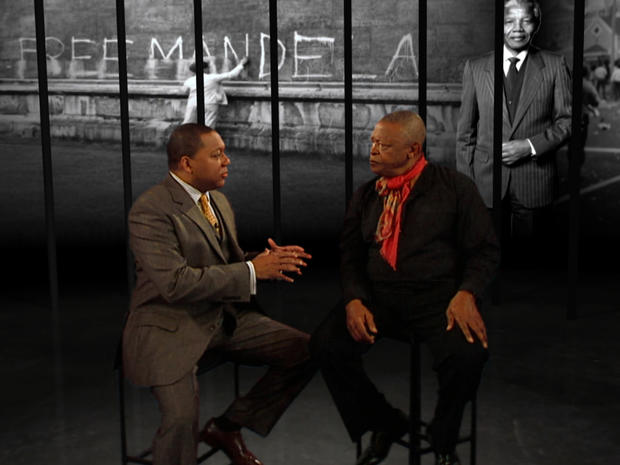Music a powerful ally in Mandela-led revolution
Political movements often have their
protest music -- a soundtrack of passion and change. But in South Africa, the
music seemed to sometimes sustain the movement itself. Nelson Mandela
understood this. And so does jazz legend and CBS News Cultural Correspondent
Wynton Marsalis.
Nelson Mandela's lifelong fight for
freedom in South Africa had a secret weapon: music. One of the masters of that
music, and a man who knew Nelson Mandela, is legendary horn man Hugh Masekela.
We got together to remember Mandela, and the music that propelled a people's
revolution.
I was honored to join him in playing
the South African national anthem,"Nkosi Sikelel' iAfrika".
Hugh Masekela: Yeah, we all knew him, I mean, from when we were children, when he went to jail he made one of the greatest speeches ever. You know. 'Freedom is a thing I stand for and I'm prepared to die for it.' And then he disappeared for 27 years.
Mandela went to prison. Musicians like Masekela and Miriam Makeba were forced into exile. But both outside and inside the country, music powered the struggle and became the soundtrack of a nation.
Marsalis: We're talking about the power of music, that music can change minds and hearts and enlighten people …
Masekela: Well, the greatest example … South Africa, is probably the only country historically where music was a major catalyst for its freedom.
Mandela: The political prisoner who would change a countryMandela's journey from prisoner to president
Complete coverage: Nelson Mandela's life and legacy
Marsalis: Can you give me an example of the type of song that you're talking about?
Masekela: There was -- a young man called Mini. And he was a major, major-- activist. And-- he was going to be hung.
But on his way to the gallows, Mini delivered a message to Hendrik Verwoerd, the architect of apartheid.
Masekela: And all the people in the cells as he was going joined him. … As this guy is going to his death and he's saying to Verwoerd, "Watch out, Verwoerd. Here comes the black man." I mean to me it's like the most -- one of the most -- probably the most powerful, like, liberation song I've ever heard.
Marsalis: It's powerful hearing you sing it here today.
"Watch out Verwould" became one of the earliest anthems for freedom. The music moved and motivated a nation of brutalized people. The American civil rights movement had songs, but in South Africa, hundreds of songs rang out."Nangue," recorded by Miriam Makeba, kept alive the spirit of Mandela and others locked up on Robben Island.
Masekela: "The nation'sl feelings when those guys were all in jail, was how much they missed them. And [the song] it says they are rotting in jail. While we need them here they are all rotting in jail. … You know, nobody had seen him since the 1960s. By the '80s, you were not allowed to say his name in South Africa.
In the mid 1980s, Masekela was far from home, making music in Botswana, when Nelson Mandela reached out to him.
Marsalis: In 1985, he was still incarcerated. He took the time to write you a letter on your birthday.
Masekela: Yeah, he just had this letter smuggled out of prison. …Here's a guy who's been in jail for 20 years, but he's writing to me giving me encouragement … I just stood there and said "Wow".. And then I went to the piano and I started singing "Bring back Nelson Mandela, bring him back home to Soweto..." And my wife said, "When did you write that song?" "I don't know," I said. '"Nelson Mandela just sent it to me."
By the late 1980's the world tuned in to South Africa's struggle. Through music, the cry for justice was heard by millions.Masekela: And we did "Graceland" with Paul Simon, we played for more than 10 million people who'd never heard of South Africa or apartheid before. And it really grabbed the world.
Masekela: The day he walked out of jail… the whole world screamed "Mandela…Africa, Amandla!"
Marsalis: When you are thinking of Mandela, what is the thing that made him able to galvanize everything around him?
Masekela: When Mandela spoke, when he spoke for us, it wasn't about him. It was about his people. Mandela really epitomizes the symbolism of our freedom. He became the mouthpiece, and the amplifier. And the horn.
